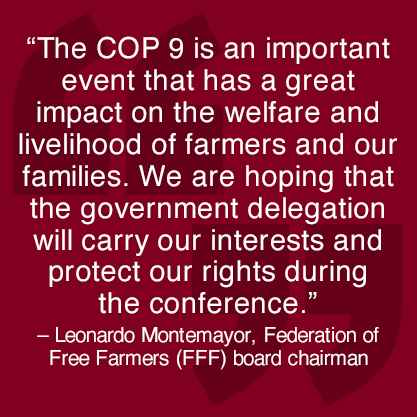Farmers’ groups in the Philippines asked the government to give the agriculture sector an equal representation in the country’s delegation to the World Health Organization Framework Convention on Tobacco Control (FCTC) Conference of Parties (COP) 9 which will be held online on November 8 to 13.
The Philippine Tobacco Growers Association (PTGA) and the Federation of Free Farmers (FFF) said they were left out in the previous COP meetings because of the Department of Health’s (DOH) alleged lobbying to exclude industry representatives and tobacco farmers.
The farmers expressed optimism that this time, the government will ensure the agriculture sector will not be overlooked. “We trust that the Foreign Affairs Sec. Locsin will let our voices be heard as his department has always protected and advocated the national interest in many occasions,” said Saturnino Distor, president of PTGA.
The Philippine COP 9 delegation should bring to the table the country’s position and not just the position of the health sector, according to the farmers’ groups. They also questioned the involvement of The Union, a Bloomberg Philanthropies-funded foreign anti-tobacco organization, which the Food and Drug Administration, an attached agency of the DOH, is consulting with. The groups discovered COP-9 related emails that included The Union as one of the recipients.
Under the law, the Department of Foreign Affairs (DFA) is the country’s lead agency in the FCTC COP 9 conference.

“The COP 9 is an important event that has a great impact on the welfare and livelihood of farmers and our families. We are hoping that the government delegation will carry our interests and protect our rights during the conference,” said former Agriculture Secretary and FFF board chairman Leonardo Montemayor.
With the threat of exclusion, the groups cautioned against a backlash to the industry that has contributed significantly to the economy—with more than P148 billion in excise tax and P93.5 billion to the universal health care in 2020.
Distor said that while they respect and recognize that the health concern associated with tobacco consumption should be addressed, “we believe that it should be done in a manner that also takes into consideration the welfare and interests of tobacco growing farmers who depend their and their families’ lives on this industry.”
Farmers expressed concern over reports that the DOH through the Food and Drug Administration (FDA) is marshalling the COP 9 delegation and sent out invitations to different government agencies to nominate their representatives, which is supposed to be the function of the DFA as the lead agency.
The DFA is mandated by Executive Order 292 and 459 as the “lead agency that shall advise and assist the President in planning, organizing, directing, coordinating and evaluating the national efforts in the field of foreign relations” and “negotiate treaties and other agreements pursuant to the instruction of the President.”
FCTC conducted a webinar in May this for its secretariat’s focal persons who are identified mainly as advocates of prohibitive tobacco control approaches, contrary to the principle of the FCTC which recognized pragmatic harm reduction strategies to reduce smoking prevalence and associated harm.
Concerns were also raised that the COP 9 will again be a venue to propose extreme regulation on cigarettes and emerging novel tobacco products like vapes and heated tobacco. Extreme measures such as bans have proven ineffective in a lot of countries and backfired to generate unintended consequences.
Among the panelists of the FCTC webinar is FDA Dir. Gen. Rolando Eric Domingo, who recently appeared as a resource speaker in a local anti-vape bill online event. Consumer groups decried Domingo’s participation in the event, saying it blatantly showed bias against a legitimate industry while he was expected to be impartial as a head of a regulatory agency.
Domingo serves as the FCTC secretariat’s focal person in the Philippines who is responsible for regularly crafting the report on the country’s status of the FCTC implementation.
The House of Representatives earlier conducted an investigation on the questionable grant received by the FDA from The Union to fund the drafting of regulations non-combustible alternatives (NCAs) to cigarettes like vapes and heated tobacco products (HTPs). The FDA admitted during the investigation that the money was used to hire job order personnel who developed the vape and HTP regulations.



















